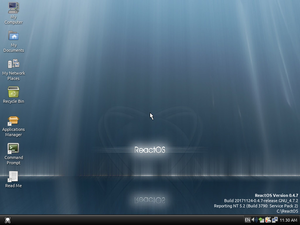
Back رياكت أو إس Arabic ReactOS Bulgarian ReactOS Catalan ReactOS Czech ReactOS German ReactOS Greek ReactOS English ReactOS Spanish ReactOS Estonian ری اکت او اس Persian

| |
 Área de trabalho do ReactOS 0.4.7 | |
| Produção | ReactOS Foundation |
| Linguagem | C |
| Modelo | Software Livre[1] |
| Versão em teste | 0.4.14 — 16 de dezembro de 2021[2] |
| Núcleo | Núcleo Híbrido — Compatível com Windows NT |
| Licença | GNU GPL, LGPL e licença BSD |
| Página oficial | www.reactos.org |
| Estado de desenvolvimento | |
|---|---|
| Alfa | |

ReactOS é um sistema livre de 1996 com licença GNU GPL, da fundação ReactOS, para computadores pessoais (prt: sistema operativo; bra: sistema operacional), com o objetivo de, compatibilidade de código binário com programas e controladores de dispositivos feitos para o sistema Microsoft Windows Server 2003 e sucessores,[3] [4] e em ser uma substituição de código livre do sistema comercial da Microsoft,[5] [6] [7] e ter informações sobre recursos não documentados da Interface de Programação de Aplicações da Microsoft (API).[8]
O ReactOS iniciou seu desenvolvimento como um projeto clone do Windows 95 chamado FreeWin95; após um período inativo devido a divergências entre os programadores, ressurgiu como ReactOS em 1997 e mudou seu foco para ser um clone da versão Windows NT5.x (2000,XP e 2003).[6] [7] [9] [10]
Desde 14 de outubro de 2020[update] ele ainda é considerado software alfa com recursos incompletos, portanto seus desenvolvedores só o recomendam para avaliação e testes.[11] Entretanto, muitas aplicações do Windows funcionam, tais como: Abyss Web Server X1 2.12.1 (Build 190530), Audacity 2.2.2, Bochs 2.6.9, Code::Blocks (with compiler) 17.12, FreeBASIC 1.07.1, FreeMat 4.2, Ghostscript 9.23 e GSview 5.0, HxD 2.3.0.0, IrfanView 4.51, Java Runtime Environment (JRE) 8u11, KVIrc 4.2.0, etc.[12][13]
O projeto do sistema é primariamente escrito em C, com alguns elementos, como o Explorador de Arquivos, escrito em C++, implementando parcialmente a Arquitetura do Windows NT, a Interface de Programação de Aplicações da Microsoft, portado para o conjunto de instruções AMD64.[14] O ReactOS, como parte do ecossistema de software livre e de código aberto, reusa e colabora com muitos outros projetos livres,[15] mais notavelmente o projeto Wine, o qual desenvolve uma camada de compatibilidade Windows para sistemas operativos tipo Unix.[16]
- ↑ «reactos/reactos: A free Windows compatible Operating System» [reactos/reactos: Um sistema operativo livre compatível com Windows] (em inglês). ReactOS. Consultado em 15 de outubro de 2020
- ↑ Finck, Colin (9 de abril de 2020). «ReactOS 0.4.14 released!!» [ReactOS 0.4.14 lançado!!] (em inglês). ReactOS Foundation. Consultado em 15 de outubro de 2020
- ↑ Holwerda, Thom (5 de abril de 2009). «ReactOS Targets Windows 2003, Vista» [ReactOS almeja Windows 2003 e Vista]. OSnews (em inglês). OSnews. Consultado em 14 de outubro de 2020. Cópia arquivada em 18 de abril de 2019
- ↑ vicmarcal (14 de abril de 2018). «ReactOS 0.4.8 released» [ReactOS 0.4.8 lançado]. Blog corporativo Project News (em inglês). Fundação ReactOS. Consultado em 13 de outubro de 2020. Cópia arquivada em 15 de abril de 2018.
With software specifically leaving NT5 behind, ReactOS is expanding its target to support NT6+ (Vista, Windows 8, Windows 10) software
- ↑ Stahl, Louis-F. (23 de junho de 2015). «Russland erklärt ReactOS zu favorisierter Windows-Alternative» [A Rússia declara que o ReactOS é a alternativa preferida do Windows]. heise online (em alemão). Consultado em 14 de outubro de 2020. Cópia arquivada em 18 de outubro de 2017
- ↑ a b Sixtus, Von Mario (20 de fevereiro de 2004). «ReactOS: Das Nicht-Windows» [ReactOS: O não Windows]. Spiegel Online (em alemão). Consultado em 14 de outubro de 2020. Cópia arquivada em 5 de dezembro de 2008
- ↑ a b Dvorak, John C. (4 de abril de 2008). «What A New OS Needs» [O Que Um Novo SO Necessita] (em inglês). PC Magazine. Consultado em 14 de outubro de 2020. Cópia arquivada em 18 de outubro de 2017
- ↑ Sugar, David (31 de janeiro de 2006). «A reaction to ReactOS» [Uma reação ao ReactOS] (em inglês). Free Software Magazine. Consultado em 11 de dezembro de 2009. Cópia arquivada em 22 de janeiro de 2009.
For those who wish to write such software, or to create portable applications that they may wish to later migrate to other platforms, it is essential to be able to target a clean and generic reference implementation of the Microsoft framework, freed from secret and undocumented behaviors.
Microsoft offers no such thing today — besides the lack of proper interface documentation, many of their own development tools depend on and offer libraries which use undocumented or secret API calls that are then built into applications. This is well illustrated in the difficulty Wine has with running applications, even those that were created purely within ‘standard’ Microsoft development tools and not using odd behaviors or undocumented functions on their own.
We can think of ReactOS, then, as the ‘Microsoft Windows documentation project’. - ↑ Kupfer, Matthias; Bragin, Aleksey (14 de março de 2010). ReactOS — Das zu Windows binärkompatible Open-Source-Betriebssystem [ReactOS — O sistema operacional de código aberto que é binário compatível com Windows]. Chemnitzer Linux-Tage (em alemão). Chemnitz, Alemanha. Consultado em 14 de outubro de 2020. Cópia arquivada em 3 de setembro de 2010
- ↑ https://reactos.orgview_html.php?sq=Bangladesh&lang=pt&q=ReactOS_FAQ
- ↑
Royal, Simon (16 de fevereiro de 2014). «ReactOS: A Windows Compatible Alternative OS» [ReactOS: Um SO Alternativo Compatível com Windows]. www.LowEndMac.com (em inglês). Consultado em 15 de outubro de 2020. Cópia arquivada em 7 de março de 2014.
(…) this is still a very early alpha version. The developers do not claim it is stable or the ability to operate as your main OS and clearly state it is ‘recommended only for evaluation and testing purposes’.
(…)
While the main core of ReactOS is built from scratch, it has some dependencies on existing software and protocols. It uses parts of Wine, networking in the form of lwIP, USB from Haiku, as well as FreeType, Mesa3D, and UniATA. - ↑ «Tests for 0.4.14» [Testes para 0.4.14]. reactos.org (em inglês). ReactOS Development Wiki. 13 de outubro de 2020. Consultado em 14 de outubro de 2020
- ↑ Holwerda, Thom (14 de novembro de 2007). «ReactOS Gets OpenOffice.org 2 Support; New Release Plans» [ReactOS Ganha Suporte ao OpenOffice.org 2; Planos de Novos Lançamentos]. www.OSNews.org (em inglês). Consultado em 15 de outubro de 2020. Cópia arquivada em 18 de outubro de 2017
- ↑
Holwerda, Thom (17 de janeiro de 2009). «ReactOS: Looking Back Upon 2008» [ReactOS: Olhando Para Trás em 2008]. www.OSNews.com (em inglês). Consultado em 14 de outubro de 2020. Cópia arquivada em 18 de abril de 2019.
Efforts to port ReactOS to the ARM anc x64 architectures are also under way, with both projects being able to initialise the first few parts of the operating system.
- ↑
«ReactOS gets USB Stack, with Help from Us» [ReactOS recebe Pilha USB, com ajuda de nós] (em inglês). Haiku (sistema operacional). 20 de fevereiro de 2012. Consultado em 2 de janeiro de 2016. Cópia arquivada em 28 de fevereiro de 2012.
The ReactOS and Haiku projects have had a friendly working relationship for several years now, with each group helping the other whenever possible.
- ↑
Vincent, Brian (15 de maio de 2004). «Interview with Steven Edwards» [Entrevista com Steven Edwards]. winehq.com (em inglês). Consultado em 6 de janeiro de 2016. Cópia arquivada em 12 de julho de 2018.
BV: Wine and ReactOS have had a mutually beneficial relationship. (…) BV: You guys have certainly contributed a lot of your work back to Wine, including some of the utilities you've written. For instance, the task manager was recently ported from ReactOS. Do you guys have any plans in the works for developing more tools? Steven: I really want to see a solitaire clone make it in to Wine and ReactOS. (…) At some point we are going to have to develop replacement components for everything in Windows so if there is a program that Wine needs and ReactOS implements it then I will try to make sure it's released under a compatible license.